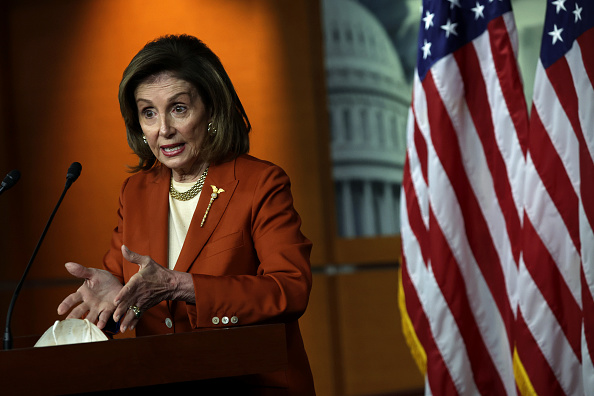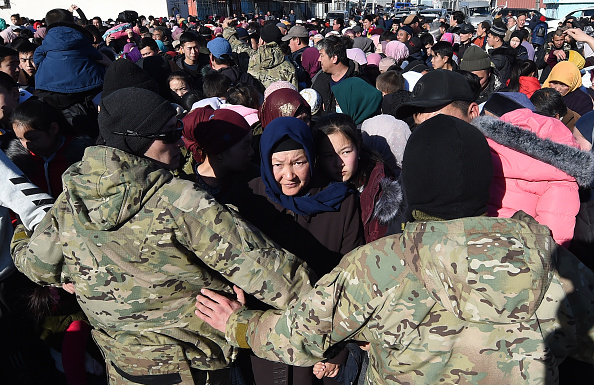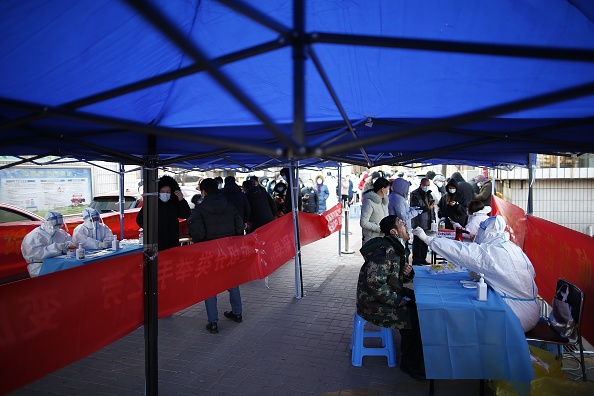
 Digital Advances
Digital AdvancesChina's State Council has issued a plan to strengthen the country's digital economy by 2025, aiming to increase the digital economy's share of the national GDP from 7.8% in 2020 to 10% in 2025. Beijing would accomplish this by pushing technologies like 6G and big data centers. Big data centers are also expected to increase the number of users with the fastest broadband connection speed available, from 6.4 million in 2020 to 60 million in 2025.
In Washington, the possibility of a strong Chinese digital economy has prompted lawmakers to move forward with a bill that would authorize billions of dollars in funding so that the U.S. doesn't lose technological leadership to China. Led by Senator Chuck Schumer (D-NY) and Speaker Nancy Pelosi (D-CA), the House is preparing to move forward on a China competitiveness bill that would boost U.S. research and development as well as aid for the domestic semiconductor industry.
While several House Republicans have slammed the legislation, some progressive groups are also concerned that the bill, amidst the technological race between the two world superpowers, might be too "aggressively focused on China." They said they fear the approach could start a new Cold War, and continue to advocate for a more collaborative approach.
Read more in, "China's Rapid Shift to a Digital Economy," by Zhang Jun, a Dean at the Fudan University School of Economics.
 Border Tensions
Border TensionsKazakhstan, the Central Asian neighbor to China and strategic partner of both China and the United States, has been rocked by a double blow of unprecedented nationwide protests and a power struggle among members of the top political elite. Initially, peaceful protests against fuel price increases turned violent, and government buildings were briefly captured or torched in several cities. Troops were ordered to shoot to kill to put down a countrywide uprising.
China and Russia have both supported Kazakhstan's response to the riots, calling into question Beijing's oft-cited non-interference policy. Chinese President Xi Jinping sent a verbal message to Kazakh President Kassym-Jomart Tokayev, expressing China's firm opposition to any attempt by external forces to provoke unrest and instigate "color revolutions" in Kazakhstan.
China shares a 1,770-km (1,110-mile) border with Kazakhstan, and instability threatens both Beijing's energy imports and Belt-and-Road projects.
Meanwhile, U.S. Secretary of State Antony Blinken called on Kazakh President Kassym-Jomart Tokayev to rescind the "shoot-to-kill" order he gave to police and security forces, and said Washington was seeking clarification on why the Central Asian nation needed to call in a Russian-led security force amid domestic unrest.
On another front, Beijing and New Delhi have concluded a 14th round of talks on their border disputes, which ended in a joint statement of agreement to seek a mutually acceptable resolution. Last month, Beijing deployed long-range strategic bombers on its Himalayan border in another apparent warning to New Delhi. China's military buildup near the demarcation line is prompting concern in the U.S. that China is becoming increasingly assertive across its territorial fault lines, including in the South China Sea.
 Omicron Woes
Omicron WoesThe Omicron variant is deepening China's Covid-19 dilemma, particularly with a recent outbreak in Tianjin, just 70 miles south of Beijing. With millions of people confined to their homes and a second round of mass testing ordered, officials are working tirelessly to protect the nation's capital and eliminate risks posed by the virus before the Beijing Winter Olympics, set to commence in three weeks. But despite the flare ups and China's ongoing pursuit of Covid-zero measures, including thousands of canceled international flights, officials have no current plans to lock down Beijing or to change the Olympics schedule, in efforts to deliver the "green, safe, and simple" Games, as called for by President Xi last week.
As China ramps up Covid-zero measures in other parts of the country to stamp out the virus, the lingering question of domestic and international economic impact remains. It's been reported that Southeast Asian countries neighboring China are currently experiencing economic hardship as a direct result of the measures and their impacts on trade. As border trade has come to a halt, shipments of perishable goods have been stuck alongside multiple borders with China, including Vietnam and Myanmar. The current "impossibility" of trading perishable agricultural goods is wreaking havoc on local bilateral trade and businesses on both sides of the border, according to Vietnam's Ministry of Trade. The situation has become particularly problematic with Lunar New Year approaching, as companies ramped up production but are now struggling to reach their intended market.
Meanwhile, China had a record-breaking trade surplus for the month of December that officials said fulfilled the country's goals. But while exports have fueled China's growth through the pandemic, domestic consumption has remained weak as local consumers are hesitant to spend. But Beijing is continuing its efforts to fortify the Chinese economy, stockpiling essentials and preparing for more domestic production, with the hopes that domestic consumption will be the growth source for the future.
Read more in "Omicron and Its Impacts on the Global Supply Chain," by Earl Carr, Founder and Chief Executive Officer at CJPA Global Advisors; Pengyu Lu, a Senior Advisor to CEO's Office & Global Research Analyst; and Gustav Andersson, Senior Global Research Analyst.
Prepared by China-US Focus editorial teams in Hong Kong and New York, this weekly newsletter offers you snap shots of latest trends and developments emerging from China every week, while adding a dose of historical perspective.
- 2022-01-07 The Dawn of a New Political Year
- 2021-12-17 Clamp Down
- 2021-12-10 Debating Democracy
- 2021-12-03 Managing Competition
- 2021-11-19 Responsible World Leadership
- 2021-11-12 A Historic Transformation
- 2021-11-05 A Green Rivalry
- 2021-10-29 Dry Tinder
- 2021-10-22 A Diplomatic Burn
- 2021-10-15 Energy Crunch
- 2021-10-08 Stoking Tensions
- 2021-10-01 Great Power Coopetition
- 2021-09-24 Sign of Goodwill?
- 2021-09-17 State of Play
- 2021-09-10 The Last Word
- 2021-09-03 Heightened Frustrations
- 2021-08-27 China’s Backyard
- 2021-08-20 Graveyard of Empires